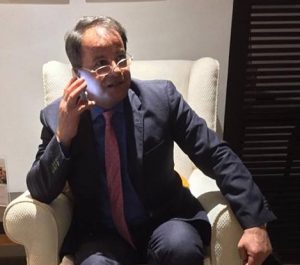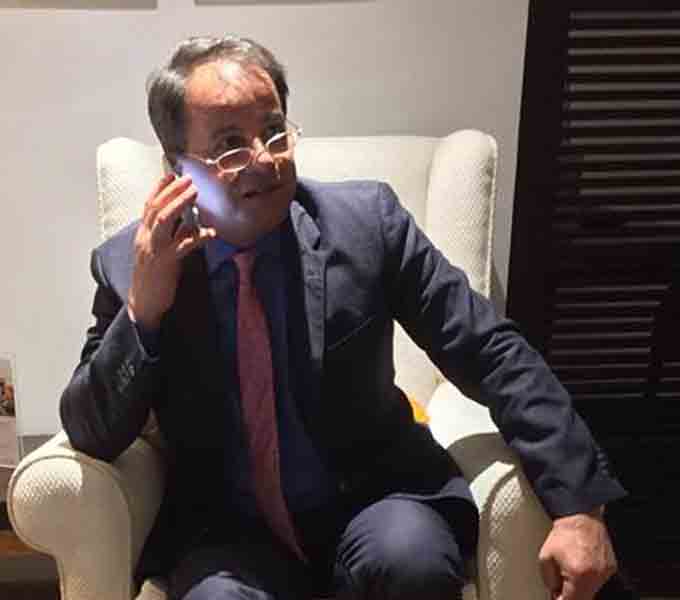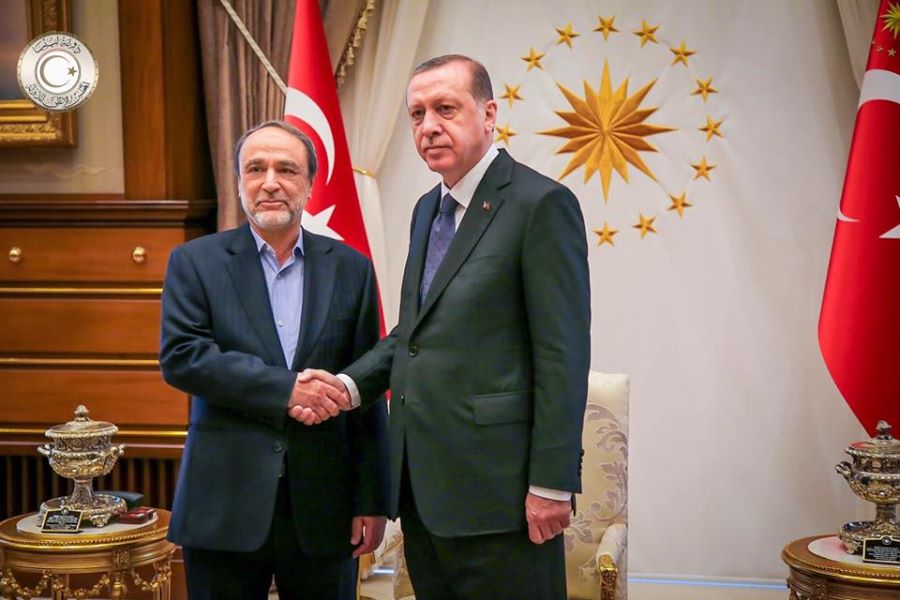By Libya Herald reporters.

Tunis, 13 July 2017:
The new UNSMIL chief Ghassan Salame should do what his predecessor Martin Kobler promised but never achieved, and divorce health and humanitarian issues from politics, Beida government health minister Reida El-Oakley has said.
“To do this, he needs to invite delegations from the south, east and west of the country to meet him and the World Health Organisation (WHO)”. Such a consortium, Oakley told the Libya Herald, would allow the WHO to distribute drugs and medical supplies throughout Libya in a coordinated and well-monitored manner.
The situation in the country was desperate he said. In the east, Zintan and the south it was particularly so. “We have no vaccines, no life saving medicines and we cannot buy them on the local market because, thanks to the real exchange rate, the black market rate, they are prohibitively expensive”.
Since 2015, the Central Bank of Libya (CBL) had been refusing to approve Letters of Credit raised by the eastern health ministry said Oakley. This meant that the rival Central Bank in Beida had been borrowing from commercial banks in order to fund ministries. Oakley said he believed that these borrowing now totalled LD22 billion. The Beida administration had received no funds from Tripoli. The only flow of money into the east came in the form of salaries which the CBL continued to disburse. The majority of Libyans throughout the country, some 80 percent, holds some sort of state job.
But there has long been a further countrywide problem linked to the ability of the WHO to buy necessary medical supplies for Libya, said Oakley. The UN organisation operates a fund which holds money that governments have released from frozen Libyan accounts specifically to provide supplies to Libyan hospitals. In 2011, the Netherlands had released $155 million of frozen funds to the WHO said Oakley. Last year the WHO had received $57 million as donations from various member states, not all of which it had dispensed. But the system is not working as it should. This newspaper has obtained a copy of a letter from June last year written by the-then German ambassador to Libya, Christian Much to Presidency Council (PC) head Faiez Serraj.
In the letter, Much urges Serraj to authorise the unfreezing on a €75 million account held by the Libyan Arab Foreign Investment Company with Deutsche Bank in Germany. That money, equivalent to some $50 million, would be paid to the WHO in Geneva who would then procure and distribute medical aid in consultation with the PC’s health minister Omar Bashir Taher. It is understood that Serraj has not replied to this letter and therefore the WHO’s efforts to support the health service in Libya had been restricted by at least $50 million. It seems possible that similar letters from other governments seeking authorisation from the PC have also not received the necessary approval from Serraj.
When shown the letter Oakley said he could only think that Serraj did not want to exceed his authority and was anxious not to end up in court one day. “But it is almost unbelievable” he said, “The Germans would not have made this proposal if their lawyers had not been satisfied it was legally sound. What it means is that the WHO is unable to provide directly and under their own control, urgently needed medical supples”.
Oakley added that a further problem was the existence of two separate Libyan Medical Supply Organisations (MSO) which he said did not speak to each other.
“As soon as we appointed the head of our MSO in 2015 we sent him Tripoli where he met everyone in the Ghwell government except the head of the MSO there. That meeting was apparently impossible”.
Likewise Oakley maintained that the Tripoli MSO, using Letter of Credit issued by the CBL had released LD 600 million in 2016 and LD 500 million last year for the purchase of essential medical products. But he questioned the scale of these disbursements. “ With that amount of money” he said, “you ought to be able to buy medicines for all six million Libyans”.
He also pointed to Tunisia where there are outstanding claims against Libya from local hospitals and clinics amounting to between $100-$150 million. That, he said, was not unmanageable when set against at least $1 billion, possibly as much as $5 billion in frozen Libyan funds in Tunisia. “Yet the Tunisian Central Bank refuses to authorise the release of any of those funds” he said. “Tunisia produces a range of pharmaceuticals. If at least some of that money were released we could buy products from them if they were up to standard. But for whatever reason, they will not do this”.
Oakley returns repeatedly to the idea that healthcare is a national issue. He is angry that his ministry, unrecognised by the Presidency Council (PC) and the international community, is left out of the funding loop even though the health needs in areas under his government are no different from those in Tripoli.
He insists that his ministry does not see any divide. After the suicide attack on the Zliten security training centre Oakley said that it was only his health ministry and the International Red Cross that had rushed trauma packs the the town and to Misrata hospital where many of the injured were treated. “In those days it was very brave to send to Misrata but for us it was an humanitarian issue. We flew the kits to Mitiga from Labraq and sent them on by road. Amazingly they arrived within the same day”.
He also says that using WHO-funded equipment, his ministry has been able to deploy six mobile surgical units including to Benina, Obari and Wirshefana. “We bought trauma kits for surgeons. We also obtained Hepatitis C treatments. They would have cost $97,000 from America. We bargained it down to $1,800. They made an exception for us because we told them if they did not, we would buy from Egypt which was much cheaper”.
Oakley insists that he is less interested in who is governing Libya than the health of its people. A UK-trained heart surgeon, he said that when the Faiez Serraj and the PC arrived in Tripoli in March 2016, he wrote his hand-over report, together with an assessment of the state of the country’s health care and what he was proposing was necessary to fix it. His hand-over report was never sent. He does not spell out why. Maybe he came under pressure from the Thinni government not to break ranks. As it was seven months later Abdullah Thinni tried unsuccessfully to fire him .
Oakley is clear that hospitals in the east are in a mess suffering from a shortage of people as well as equipment. “Before 2014 there were 3,000 hospital beds in Benghazi. Now there are just 1,000. Gumhoriya hospital [in Sabri] has been wrecked, Hawari hospital is handling mostly outpatients and Jalaa and the Benghazi Medical Centre are poorly staffed. It is a disaster. Ninety percent of our foreign workers have departed. We have to make do with what is available, which unfortunately is not very good”.
Foreign workers did not simply leave because of the collapsing security, he said. There was also the problem of being paid. The collapsing value of the dinar impacted their earnings since they had to be converted to foreign currency through the black market.
Oakley said that someone was currently in Uganda promising to recruit 1,000 doctors and nurses for the east. He admits that if the scheme comes off – and he seems sceptical – this will deprive Uganda of much-needed home-grown medical talent. But he makes it clear that this hiring is a reflection of the desperate straits in which the health system in the east of the country finds itself.
It is put to him that the one person in Libya who has managed so far to keep his organisation above politics is National Oil Corporation (NOC) chief Mustafa Sanalla. Could Libya’s health service claim for itself a similar exception? It is clear that he is not entirely happy with the comparison, but Oakley does accept that NOC has set an example. The problem however is that the political divide is also reflected in a divide in the health services of east and west.
Insisting that he is a medical academic more than he is a politician Oakley shows himself impatient with the negotiations over the Libyan Political Agreement (LPA)
“We know that political dialogues can last for many years” he said, “ but peoples’ health cannot wait. They need treatment now, or they will die”.









